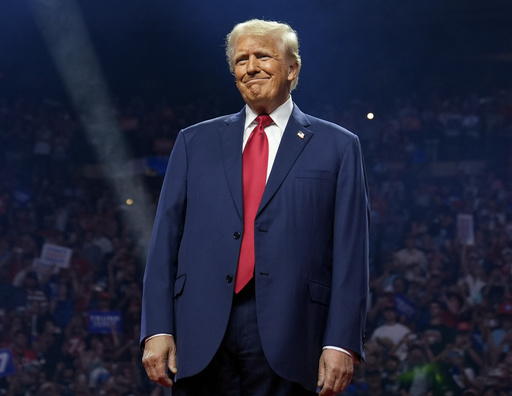President-elect Donald Trump has announced plans to fast-track federal permits for energy and construction projects exceeding $1 billion. However, this initiative may face various regulatory and legislative obstacles, particularly from a significant law requiring federal agencies to assess environmental impacts before approving major projects.
On Tuesday, Trump shared on his Truth Social platform that anyone investing $1 billion within the United States “will receive fully expedited approvals and permits, including, but not limited to, all Environmental approvals.” He encouraged investors by stating, “GET READY TO ROCK!!!”
Although Trump did not clarify who would qualify for these accelerated approvals, many proposed energy initiatives across the country fall into the billion-dollar category, including natural gas pipelines, export terminals, solar installations, and offshore wind farms.
Environmental organizations quickly criticized Trump’s proposal, labeling it illegal and in direct violation of the National Environmental Policy Act. This 54-year-old legislation requires federal agencies to consider potential environmental impacts and evaluate alternative actions before moving forward with projects.
Lena Moffitt, executive director of Evergreen Action, condemned Trump’s strategy, accusing him of prioritizing corporate interests over environmental protection. She argued that such a plan could lead to increased pollution, higher costs, and limited energy options for American citizens.
Alexandra Adams, chief policy advocacy officer at the Natural Resources Defense Council, voiced concerns about the implications of such an initiative. She raised the possibility of detrimental projects being fast-tracked next to Trump’s properties, suggesting that there are sound reasons for Congress to mandate thorough assessments of community impacts to ensure that harmful projects are not approved.
Kevin Book, an energy analyst, noted that while Trump’s announcement reflects his characteristic showmanship, it also highlights a genuine issue: the bipartisan desire for permitting reform that expedites major environmental projects, which often require years for approval.
“The substance here is he is really serious about trying to get permitting reform done,” Book stated, emphasizing the need for resolving permitting delays that hinder various sectors, including energy. He observed that there are several billion-dollar investments currently awaiting permitting reforms.
A bipartisan proposal led by Senate Energy Committee Chairman Joe Manchin of West Virginia and Wyoming’s Senator John Barrasso aims to expedite permitting for significant energy and mineral projects, though its viability remains uncertain as the current congressional session draws to a close.
Barrasso and Manchin contend that their plan would promote all types of energy projects, leading to lower costs, job creation, and maintaining the U.S.’s position as a global energy powerhouse. Nevertheless, opponents argue that this legislation threatens to open vast public lands and waterways to oil and gas drilling while undermining essential executive and judicial oversight.
Representative Raul Grijalva of Arizona criticized the proposal, asserting that catering to the demands of fossil fuel companies does not equate to genuine permitting reform. He labeled the bill “a dirty deal” that would exempt numerous oil and gas drilling endeavors from federal scrutiny, allowing unchecked toxic waste disposal on public lands.
Jason Miller, a senior adviser to Trump, predicted that a second Trump administration would usher in a period of major regulatory reductions, accompanying his mantra of “drill, baby, drill.” He expressed Trump’s commitment to attracting investment by prioritizing deregulation to rejuvenate the economy.
Miller clarified that this initiative would apply to both domestic and foreign investments, emphasizing Trump’s goal of bringing in capital while minimizing regulatory hindrances.
Trump’s announcement may temporarily complicate the pursuit of permitting reform this year, as Republicans may opt to postpone it until next year when they will regain control of both congressional chambers and the White House. Nonetheless, the topic is expected to resurface quickly in the new year.



